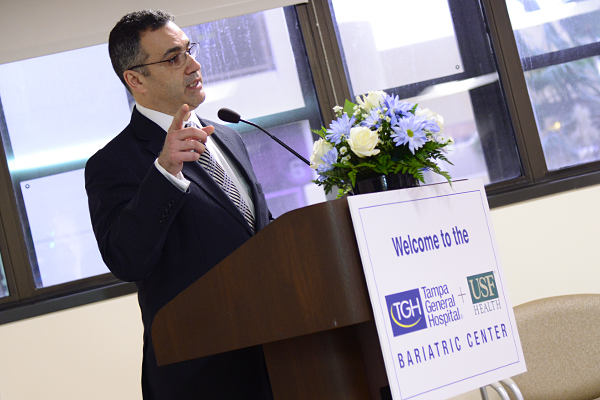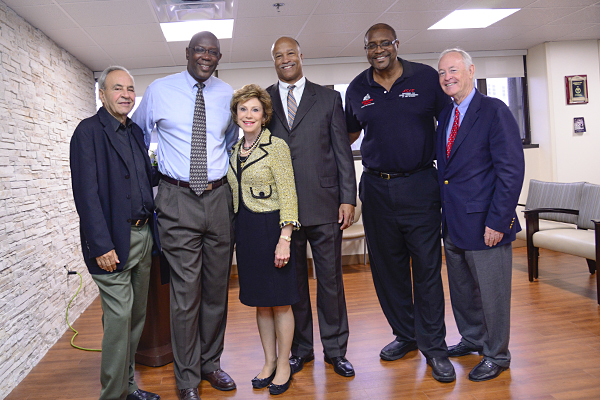The long-running and successful bariatric program at Tampa General Hospital entered a new phase when a red satin ribbon was cut April 22, signifying the opening of the Bariatric Center, a joint program of Tampa General Hospital and USF Health.
With expanded multidisciplinary services, the Center now provides a one-location approach to bariatric surgery that includes the critical peripheral services and long-term support each patient needs to succeed in their weight loss. The Center’s comprehensive team of bariatric physicians, psychologists, dietitians and exercise physiologists will work together to create a customized weight management program for each individual. Non-surgical weight loss programs will also be offered for those with serious medical issues.

The Center is the first partnership between USF Health and Tampa General Hospital since TGH President and CEO Jim Burkhart, DSc, MSHHA, FACHE, arrived two months ago, a connection USF President Judy Genshaft emphasized in her remarks at the ribbon-cutting ceremony.
“Today, we mark another milestone in the fantastic partnership that has existed between Tampa General and USF for many years, and one that illustrates the power of our collaboration,” she said.
“Tampa General Hospital and USF have long been leaders in bariatric surgery and weight management. We have worked hard to build what is already recognized as one of the best programs in the country. But we truly believe the people of Tampa Bay region deserve nothing less than the latest and best medical care available, and today we take another step forward to make that happen.”
Dr. Burkhart underscored the TGH/USF partnership, citing it as his main reason for joining TGH.
“Tampa General Hospital is the number one hospital in Florida and is the reason I’m here, and the relationship between USF and Tampa General is the reason I’m here,” Dr. Burkhart said.
USF’s Doctors of USF Health CEO Jeff Lowenkron, MD, agreed.
“We have a strong partnership in which we keep patients at the center of care and then build something around it to help,” Dr. Lowenkron said. “A center like this wouldn’t happen if we didn’t collaborate.”

Michel Murr, MD, director of the Bariatric Center.
Having already earned certifications for quality and designations as a Center of Excellence and already considered the busiest bariatric hub in the southeast –helping nearly 4,000 patients – the bariatric program has been long considered a leader in the Tampa Bay area. In 2005, the TGH bariatric program became the first in the nation to receive disease-specific certification from the Joint Commission on Accreditation of Health Care Organizations. And in 2007, the program was designated a Bariatric Center of Excellence by the American Society of Bariatric Surgery.
“Fifteen years ago, we asked how do we stem the obesity epidemic and what practical solutions can we offer to those afflicted with obesity on a day-to-day basis,” said Michel Murr, MD, professor of surgery at the USF Morsani College of Medicine and director of Bariatric Surgery at Tampa General Hospital.
“Today, we offer a new patient-centered approach, integrating service lines for obesity and providing them total care, right here.”

L to R: USF and TGH officials who spoke at the opening included USF President Judy Genshaft; Jim Burkhart, TGH president and CEO; Jeffrey Lowenkron, MD, CEO for the USF Physicians Group; and Deana Nelson, TGH executive vice president and chief operating officer.
In addition to Dr. Murr, surgical procedures are performed by John Paul Gonzalvo, DO, assistant professor of surgery and associate director of the USF/TGH Bariatric Surgery Fellowship Program.
The new Center, a 5,500-square-foot facility in the Harbourside Medical Tower on the Tampa General campus, features examination rooms and education rooms where patients will work with Center staff as they progress through the program. Anyone interested in bariatric surgery must attend one of the informational sessions held at the Center each month. Patients admitted to the program then spend about six months learning the nuances of what bariatric surgery means – the life-long commitment and dietary regimen they face – before surgery is performed.

Meghann Scholl, RD, dietician for the Bariatric Center, with the props she uses to educate patients on making smart food choices, including a model of fat (left) and smooth muscle.
The new Bariatric Center offers several procedures, including gastric bypass, sleeve gastrectomy, adjustable gastric banding, and revisional bariatric surgery. Most of the time, the procedures are performed under general anesthesia and laparoscopically. Expected weight loss is 43 to 65 percent of the excess weight, depending on which procedure is performed.
But the biggest story, Dr. Murr said, is the improved health.
“People with clinically severe obesity have a much higher mortality rate than those of normal weight,” Dr. Murr said. “Bariatric surgery significantly decreases the incidence of obesity-related diseases, and it considerably improves the quality of patients’ lives.”
Studies indicate that bariatric surgery can improve various chronic, debilitating health conditions, including diabetes, hypertension, sleep apnea, congestive heart failure, fatty liver disease, hyperlipidemia, heartburn, asthma, arthritis, and infertility.
Bariatric Center patients receive follow-up care and guidance from team dieticians and psychologists as long as they need the assistance to continue with the behavior modifications that help maintain weight loss.
The celebration also included a sports connection with the announcement of a new initiative between the Bariatric Center and retired professional football players. Working with the Living Heart Foundation, the National Football Players Association, and Covidien (a healthcare products and medical devices manufacturer) the newly opened Center will collaborate on a project called HOPE (Heart, Obesity, Prevention and Education). This national health screening program for high school and college athletes recently expanded to include current and retired professional football players.

Left to right: Dr Joseph Diaco, Tampa Bay Bucs team doctor for 33 years; Hiram Green, director of USF Health Community Engagement; USF President Judy Genshaft; Jerry Bell, former NFL player and president of the Tampa Chapter of the NFL Players Association; Tyrone Keys, former NFL player; and Dr. Arthur (Archie) Roberts, former NFL player, retired cardiothoracic surgeon and founder of Living Heart Foundation/HOPE (Heart Obesity Prevention Education).
“Our Center will certainly help those retired players who are afflicted with obesity and joint damage, and who have severe limitations for exercise. They will have access to our expertise for a range of behavior modification techniques,” Dr. Murr said.
The HOPE Program is a comprehensive obesity research initiative designed to promote healthy lifestyles and weight-management among former professional football players. These former players, when compared to smaller-sized men, are more likely to have cardiovascular problems and other health issues associated with being overweight. The HOPE Program was launched in October 2012 at Temple University Hospital.
For more information about the program, visit www.tgh.org/weight.htm or call (813) 844-7473.
– Photos by Eric Younghans, USF Health Communications
